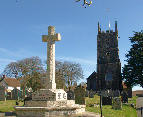Samuel Frank Hutchings, always known as Frank, and listed as such on the Memorial Roll in Winkleigh church, was born about the year 1880. He was the third and youngest child of Edwin Hutchings, a farmer, and his wife Mary Luxton. They were married in 1877. Frank was already about 34 years old when the war broke out, and it is unlikely that he was enlisted into the Devonshire regiment until late 1916.
According to the 1911 census, Frank was farming the 68 acre farm called Lower Narracott, worth £70 a year in rent. We know from a report in the 'Western Times' dated 13th September 1912 that the farm was sold to Mr. J. Cole for £1450, and it is likely that Frank and his family then moved on to take the tenancy of Hill Farm, Winkleigh. Certainly he was there and until 1916 had been excused military service on the grounds of his role in a vital industry. But by 1916 the army was demanding more and more men. The 'North Devon Journal' for 4th May 1916 recorded that Frank appeared before a military tribunal to consider further exemption, but he was granted only a furher 6 months. It is probable, therefore, that Frank was enlisted sometime in October 1916.
Frank was allocated to join the Devonshire regiment. Successful in this preference Frank would have proceeded for initial training to the 3rd Battalion depot in Exeter, from where he could have kept better in touch with his farm and family in Winkleigh. From there he was either sent as part of a draft to one or other of the battalions in France, or he was transferred at once into one of the Devonshire Labour Companies: we have no clues on his medal card except that he was awarded both the Victory and the British medals after the war, which would indicate some form of foreign service. Frank's military records were destroyed, like so many others, in the London blitz.
At some point Frank was transferred into the Labour Corps, which indicates that he was medically unfit for any kind of front-line service. This could have been the result of his age or a wounding or sickness - we have no clues. The Labour Corps was not founded before January 1917, so that he could have been transferred from the Devons as soon as basic training was over. Labour battalions of course existed before 1917, but they were attached to the Regiments - the distribution of Devons battalions is listed on this site. The 12th and 14th Labour battalions wnere transferred to the newly formed Labour Corps in April 1917. Possibly, therefore, Frank was posted to one of the four Labour Companies composed of Devons, the 152nd, 153rd, 154th or the 155th.
The Corps always suffered from its treatment as something of a second class organisation: for example, the men who died are commemorated under their original regiment, with Labour Corps being secondary. The Winkleigh Roll of Honour, compiled by Colonel Alexander follows this formula, so that the Winkleigh men who served in the Labour Corps were not listed as such. Researching men of the Corps is made extra difficult by this, as is the fact that few records remain of the daily activities and locations of Corps units. Sadly the war diaries of the four Devons battalions were disposed of between the wars.
Formed in January 1917, the Corps grew to some 389,900 men (more than 10% of the total size of the Army) by the Armistice. Of this total, around 175,000 were working in the United Kingdom and the rest in the theatres of war. The Corps was manned by officers and other ranks who had been medically rated below the “A1” condition needed for front line service. Many were returned wounded. In spite of its second class status, Labour Corps units were often deployed for work within range of the enemy guns, sometimes for lengthy periods and in the crises of March and April 1918 on the Western Front, Labour Corps units were used as emergency infantry.
Today, the contribution made to eventual victory by the Labour Corps is fully recognised. The total number of men engaged on work in France and Flanders alone approximated 700,000 at the end of the war, and this was in the labour units alone. In many cases the men of the infantry, artillery and other arms were forced to give up time to hard effort when perhaps training or rest might have been a more effective option.
20th June 2018


